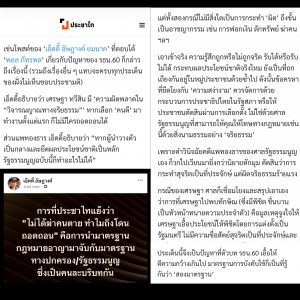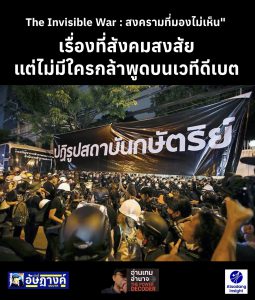
ผลกระทบของมาตรการตอบโต้ของกัมพูชาต่อไทยและต่อกัมพูชาเอง
#อัษฎางค์ยมนาค #อ่านเกมอำนาจ #ตอบโต้เขมร
มาตรการที่กัมพูชาตอบโต้ไทยในกรณีพิพาทชายแดนล่าสุด
ในกรณีพิพาทชายแดนระลอกล่าสุดระหว่างไทยกับกัมพูชา ฝ่ายกัมพูชาได้ประกาศและดำเนินมาตรการตอบโต้ต่อไทยอย่างชัดเจน โดยเฉพาะหลังจากที่ไทยมีมาตรการปิดจุดผ่านแดนบางแห่งและจำกัดเวลาการเข้า-ออกชายแดนตั้งแต่วันที่ 7 มิถุนายน 2568 เป็นต้นมา มาตรการตอบโต้ของกัมพูชามีรายละเอียดสำคัญดังนี้
▍6 มาตรการหลักที่กัมพูชาประกาศตอบโต้ไทย
1. ระงับการนำเข้าสินค้าจากไทย
• กัมพูชาจะหยุดนำเข้าสินค้าจากประเทศไทยเข้าสู่ตลาดกัมพูชา และหันไปใช้สินค้าที่ผลิตในประเทศหรือจากประเทศอื่นแทน
2. หาตลาดรองรับสินค้าเกษตรของกัมพูชา
• เตรียมรับซื้อผลผลิตทางการเกษตรของประชาชนที่เคยส่งออกไปไทย พร้อมเร่งหาตลาดรองรับทั้งในประเทศและต่างประเทศ
3. เปลี่ยนเส้นทางการรักษาพยาบาล
• งดส่งผู้ป่วยกัมพูชามารักษาตัวในโรงพยาบาลไทย และเปลี่ยนไปใช้บริการในประเทศกัมพูชาเอง หรือประเทศอื่นแทน.
4. เตรียมรับแรงงานกัมพูชากลับประเทศ
• เตรียมความพร้อมรองรับแรงงานกัมพูชาที่จะเดินทางกลับจากไทย โดยจัดหางานให้รองรับ เนื่องจากกัมพูชากำลังขาดแคลนแรงงานในภาคอุตสาหกรรม เกษตรกรรม และก่อสร้าง
5. ระดมกำลังทหารตามแนวชายแดน
• เพิ่มความเข้มงวดและจัดกำลังทหารตลอด 24 ชั่วโมงตามแนวชายแดน เพื่อรับมือกับสถานการณ์และลดความเสี่ยงจากการปะทะ
6. ตัดสัญญาณไฟฟ้าและอินเทอร์เน็ตที่เชื่อมโยงกับไทย
• มีการเริ่มตัดสัญญาณอินเทอร์เน็ตที่เชื่อมโยงกับฝั่งไทย และเตรียมระงับการซื้อไฟฟ้าจากไทย หากสถานการณ์ยังไม่คลี่คลาย
▍ มาตรการเพิ่มเติมและการดำเนินการจริง
• จำกัดระยะเวลาพำนักของคนไทยในกัมพูชา
• กัมพูชาประกาศจำกัดระยะเวลาพำนักของพลเมืองไทยที่เดินทางเข้ากัมพูชาเหลือเพียง 7 วัน จากเดิม 60 วัน เพื่อตอบโต้ไทยที่ใช้มาตรการเดียวกัน
• ปิดจุดผ่านแดนตามเวลาที่ตอบโต้ไทย
• กัมพูชาปรับเวลาเปิด-ปิดจุดผ่านแดนให้แตกต่างจากไทย เช่น ไทยเปิด 08.00-16.00 น. กัมพูชาเปิด 09.00-16.00 น.
• ยืนยันนำข้อพิพาทขึ้นศาลโลก (ICJ)
• กัมพูชายังคงยืนยันจะนำข้อพิพาทเกี่ยวกับ 4 พื้นที่ชายแดนขึ้นสู่การพิจารณาของศาลยุติธรรมระหว่างประเทศ (ICJ)
▍ สรุป
มาตรการตอบโต้ของกัมพูชาในกรณีพิพาทชายแดนล่าสุดกับไทยมีทั้งเชิงเศรษฐกิจ สังคม และความมั่นคง โดยเน้นการระงับนำเข้าสินค้าไทย หาตลาดใหม่ให้สินค้าเกษตร เปลี่ยนเส้นทางรักษาพยาบาล เตรียมรับแรงงานกลับประเทศ เพิ่มกำลังทหาร ตัดไฟฟ้าและอินเทอร์เน็ตที่เชื่อมโยงกับไทย รวมถึงมาตรการจำกัดการพำนักของคนไทยในกัมพูชาและการนำข้อพิพาทขึ้นศาลโลก
✦ ผลกระทบของมาตรการตอบโต้ของกัมพูชาต่อไทยและต่อกัมพูชาเอง
▍ ผลกระทบต่อประเทศไทย
• ผลกระทบโดยตรงต่อเศรษฐกิจไทยมีจำกัดในระยะสั้น
• รัฐบาลไทยประเมินว่ามาตรการตอบโต้ 6 ข้อของกัมพูชา เช่น การหยุดนำเข้าสินค้าไทย ตัดไฟฟ้า ตัดอินเทอร์เน็ต หรือไม่ส่งผู้ป่วยมารักษาในไทย ยังไม่ส่งผลกระทบอย่างมีนัยสำคัญต่อระบบเศรษฐกิจหรือความมั่นคงของไทยในขณะนี้ โดยเฉพาะในระยะสั้น ผู้ประกอบการไทยยังไม่ได้รับผลกระทบชัดเจนจากการหยุดนำเข้าสินค้าของกัมพูชา และประชาชนตามแนวชายแดนยังเดินทางกลับบ้านได้อย่างปลอดภัย
• ผลกระทบเชิงพาณิชย์และการค้าชายแดน
• ธุรกิจค้าชายแดนและผู้ส่งออกไทยอาจได้รับผลกระทบบ้าง โดยเฉพาะผู้ส่งออกสินค้าอุปโภคบริโภคไปกัมพูชา หากมาตรการยืดเยื้อหรือขยายวงกว้าง เช่น การปิดด่าน 100% อาจทำให้การค้าชายแดนที่มีมูลค่าหลายหมื่นล้านบาทต่อเดือนหยุดชะงัก
• การจำกัดเวลาเปิด-ปิดด่านและการตรวจสอบที่เข้มงวดขึ้น ส่งผลให้การขนส่งสินค้าไม่สะดวก สินค้าตกค้าง และยอดขายลดลง โดยเฉพาะหากสถานการณ์ยืดเยื้อ
• ผลกระทบต่อแรงงานและการท่องเที่ยว
• หากกัมพูชาดึงแรงงานกลับประเทศ อาจกระทบต่อบางอุตสาหกรรมในไทยที่พึ่งพาแรงงานกัมพูชา แต่ยังไม่มีสัญญาณชัดเจนในระยะสั้น
• การจำกัดระยะเวลาพำนักของคนไทยในกัมพูชาและการลดการท่องเที่ยวข้ามแดน มีผลกระทบต่อธุรกิจท่องเที่ยวและคาสิโนในกัมพูชามากกว่าไทย
▍ ผลกระทบต่อกัมพูชา
▍ ผลกระทบเชิงเศรษฐกิจและสังคมรุนแรงกว่า
• กัมพูชาได้รับผลกระทบมากกว่าไทยอย่างมีนัยสำคัญ โดยเฉพาะประชาชนที่พึ่งพาสินค้าอุปโภคบริโภคจากไทย เมื่อหยุดนำเข้าสินค้าจากไทย ราคาสินค้าในกัมพูชาสูงขึ้นทันที แม้จะนำเข้าสินค้าจากจีนหรือเวียดนามแทนได้ แต่ค่าขนส่งสูงกว่าและไม่สะดวกเท่า
• พ่อค้าแม่ค้ากัมพูชาที่เคยนำของป่าและพืชผลข้ามมาขายฝั่งไทยขาดรายได้ทันที
• การจำกัดการส่งผู้ป่วยไปรักษาในไทยส่งผลกระทบต่อประชาชนกัมพูชาที่ต้องการการรักษาพยาบาลคุณภาพสูง เนื่องจากโรงพยาบาลในไทยมีศักยภาพสูงกว่าโรงพยาบาลในกัมพูชา
▍ ผลกระทบต่อแรงงาน
• แรงงานกัมพูชาที่เดินทางไปทำงานในไทยจำนวนมาก (ประมาณ 1.5 ล้านคนทั้งถูกกฎหมายและผิดกฎหมาย) ขาดรายได้ทันทีหากต้องกลับประเทศ และกัมพูชาเองยังไม่มีศักยภาพในการรองรับแรงงานเหล่านี้อย่างเพียงพอ
• ผลกระทบต่อระบบพลังงานและโครงสร้างพื้นฐาน
• การตัดไฟฟ้าหรืออินเทอร์เน็ตที่เชื่อมโยงกับไทย แม้กัมพูชาจะหันไปซื้อไฟฟ้าจากเวียดนามหรือลาวได้ แต่ในทางปฏิบัติยังมีข้อจำกัดเรื่องโครงข่ายและต้นทุนที่สูงขึ้น บางพื้นที่อาจขาดไฟฟ้าใช้
▍ ผลกระทบเชิงจิตวิทยาและความมั่นคง
• มาตรการเหล่านี้ถูกมองว่าเป็นการสร้างแรงกดดันทางจิตวิทยาต่อไทยและสร้างความรู้สึกเป็นเหยื่อในหมู่ประชาชนกัมพูชา แต่ในทางปฏิบัติกระทบต่อความเป็นอยู่ของประชาชนกัมพูชาเองมากกว่าฝ่ายไทย
ภาพรวมและข้อสังเกต
• ผลกระทบจากมาตรการตอบโต้ของกัมพูชาต่อไทยยังไม่รุนแรงในระยะสั้น แต่ถ้าสถานการณ์ยืดเยื้อหรือมาตรการเข้มข้นขึ้น จะกระทบต่อเศรษฐกิจชายแดน การค้า การลงทุน และแรงงานของทั้งสองประเทศ โดยกัมพูชาจะได้รับผลกระทบมากกว่าอย่างชัดเจน ทั้งด้านค่าครองชีพ รายได้ประชาชน การรักษาพยาบาล และความมั่นคงทางพลังงาน
• ในทางยุทธศาสตร์ มาตรการของกัมพูชาถูกมองว่าเป็นการต่อรองและสร้างแรงกดดันทางการเมืองมากกว่าการดำเนินการจริงจังในระยะยาว เพราะหากทำจริงจะกระทบประชาชนกัมพูชาเองอย่างรุนแรง
The Impact of Cambodia’s Retaliatory Measures on Thailand—and on Cambodia Itself
#EddieAtsadang #PowerAnalysis #CambodianResponse
▍Cambodia’s Retaliatory Measures in the Latest Border Dispute
In response to Thailand’s decision to temporarily close certain border crossings and restrict border access starting 7 June 2025, the Cambodian government has announced and begun implementing a series of retaliatory measures. These actions are part of the broader reaction to the most recent round of tensions along the Thai-Cambodian border. The six primary measures announced by Cambodia include:
1. Suspension of Imports from Thailand
Cambodia has declared a halt to the importation of Thai goods, shifting instead to domestic or third-country alternatives.
2. Redirecting Agricultural Exports
The government is preparing to purchase agricultural products from local farmers who previously exported to Thailand, while actively seeking new domestic and international markets.
3. Diverting Medical Treatment Routes
Cambodia will stop sending patients to Thai hospitals, opting instead for domestic facilities or alternative countries.
4. Repatriation of Cambodian Workers
Authorities are preparing to receive Cambodian laborers returning from Thailand, with plans to reintegrate them into local industries such as agriculture, construction, and manufacturing, which are experiencing labor shortages.
5. Military Mobilization Along the Border
Cambodia has increased military presence along the border to maintain 24-hour surveillance and deter any escalation or confrontation.
6. Cutting Electricity and Internet Connectivity from Thailand
The Cambodian government has begun severing internet links connected to Thailand and is preparing to suspend electricity imports if the situation remains unresolved.
▍Additional Measures Already in Effect
• Restricting Thai Nationals’ Stay in Cambodia
The permitted stay for Thai citizens entering Cambodia has been reduced from 60 days to just 7 days, mirroring Thailand’s own restrictions.
• Asymmetrical Border Gate Hours
Cambodia has changed its border opening hours to be out of sync with Thailand. For instance, if Thailand opens from 08:00–16:00, Cambodia now opens from 09:00–16:00.
• Insistence on Bringing the Dispute to the ICJ
Cambodia continues to push for the submission of four disputed border areas to the International Court of Justice (ICJ) for resolution.
▍Summary of Cambodia’s Retaliatory Framework
Cambodia’s response includes economic, social, and security dimensions: halting Thai imports, seeking new markets for agricultural products, redirecting medical patients, repatriating workers, increasing border military activity, and severing cross-border electricity and internet services. These are coupled with diplomatic moves and procedural challenges, such as limiting Thai visitor stays and initiating proceedings with the ICJ.
✦ The Impact of Cambodia’s Retaliation: On Thailand and on Cambodia
▍Impact on Thailand
• Limited Short-Term Economic Impact
The Thai government has assessed that Cambodia’s six primary measures—such as halting imports, cutting electricity, or refusing to send patients for treatment—have not significantly affected Thailand’s economy or national security in the short term. Thai businesses have not yet seen major disruptions, and border communities are still able to travel safely.
• Impact on Cross-Border Trade
Border trade and Thai exporters may experience some disruption, especially in sectors involving consumer goods. If measures are prolonged or intensified—such as full border closures—the economic effect could be more pronounced, given that Thai-Cambodian border trade is valued in the tens of billions of baht monthly.
Border hour restrictions and stricter inspections have also slowed cargo movement, caused backlogs, and affected sales.
• Labor and Tourism Concerns
Should Cambodia proceed with mass repatriation of its workers, certain Thai industries reliant on Cambodian labor may face labor shortages. However, no significant disruption has been observed so far.
Restrictions on Thai travel to Cambodia may hurt Cambodian tourism and casino industries more than they impact Thailand.
▍Impact on Cambodia
• Greater Economic and Social Costs
Cambodia faces more serious consequences. Consumers reliant on Thai goods have encountered rising prices. While Chinese or Vietnamese imports may serve as substitutes, they are often costlier and logistically burdensome.
Cambodian traders who once relied on selling forest and agricultural goods across the border have abruptly lost their income.
Patients who would have received higher-quality care in Thailand are now forced to rely on Cambodia’s limited healthcare infrastructure.
• Labor Repatriation Challenges
There are an estimated 1.5 million Cambodian workers in Thailand (both documented and undocumented). If forced to return, they face sudden income loss, and the Cambodian economy lacks the capacity to absorb them effectively.
• Energy and Infrastructure Risks
Cutting electricity and internet connectivity with Thailand could disrupt services in certain areas. While alternative sources—such as power from Vietnam or Laos—are possible, limitations in infrastructure and higher costs may hinder access, especially in remote regions.
• Psychological and Security Implications
While these measures are portrayed domestically as assertive responses to Thai actions, they create a form of psychological pressure on Thailand while simultaneously burdening the Cambodian public. The strategy may amplify nationalism but is more likely to degrade living conditions within Cambodia itself.
▍Observations and Strategic Implications
The short-term impact on Thailand is limited. However, if the situation persists or escalates, both economies could experience strain—especially in border trade, investment, and labor. Nonetheless, Cambodia is poised to bear the greater cost in terms of living expenses, public income, healthcare, and energy security.
From a strategic standpoint, Cambodia’s retaliatory posture appears more political than practical. Many of the announced measures may function as leverage or symbolic pressure rather than long-term policy, as their continued enforcement would harm Cambodian society more than Thai interests.



